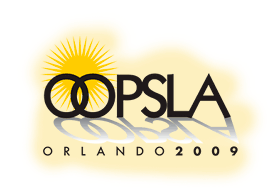
 Fragile Ideas
Fragile IdeasOnward! is a forum for sharing ideas that are incredibly new and experimental. They don’t always make sense, and they’re not always totally thought through. They’re very easily killed, especially if subjected to the usual (let’s just say it) nerdy challenge. The Fragile Ideas workshop is about building a new kind of discourse for the Onward! community. It’s about teaching cynics and skeptics how to become idea facilitators and explorers. By learning and practicing a communication process adapted from a Writers’ Workshop approach, every participant will walk away from this workshop with two things: a nurtured and growing idea, and a way to talk to people without shutting them down.
Computer scientists are a skeptical bunch. We’re taught to debug, to deconstruct, to Question. Everything. How many times have we had a tiny glimmer of a thought, a small glint of light in the darkness of lack of understanding, only to run to our best friend in the next cubicle, inarticulate it to him (let’s blame men here), and then have him say “Yeah…but….” And so the light goes out. The glint extinguishes. The glimmer vanishes. Our idea dies. Or at least it is severely hobbled. We leave, shoulders hunched, and slink back to our own cube, contemplating whether we are really as smart as we thought we were when we woke up this morning.
Conferences are no better. You go to conferences for the exchange of ideas, You travel across the world. Maybe you give a talk! And after the talk, there are questions—and you answer them! Yes! After the session you feel a sense of success as people start coming to the front to talk to you. But after the first couple of congratulatory “I like your idea!” comments, the monster of skepticism and cynicism rears its ugly head again: “but, I’m just wondering, how would it work in situation x?,” “this is neat, but would it scale?,” “This is cool—but I think it’s been done before, have you read Z?” Either you have an answer for these questions or you don’t. If you don’t, you feel like a git, and humbly start taking notes as people suddenly have a thousand suggestions for things you can look at to see that in fact your work is redundant. If you do, you wind up disappointed with your community—you think “who needs these guys (men, again)?” and you realize that you’re working in spite of them, not thanks to them. Either way, the experience isn’t as positive as it should be. And it doesn’t do what it should have done, which is promoted your idea, and helped it to grow.
Onward! is a different kind of conference. It’s a conference about ideas that you don’t know will scale, and that will probably sound like a lot of others that went before. Skeptics and cynics will have an absolute field day! And we do! All of us! We attend Onward! waiting to be wowed, and in love with the idea of being subversive and pushing the boundaries of thinking about programming, but in the end, our default discourse is cynicism and skepticism, both of which amount to idea killing. We bumble up to the author of some cool paper, and the first word out of our mouths after the “wow—cool idea” is “but.”
The Fragile Ideas workshop is about building a new kind of discourse for the Onward! community. It’s about teaching cynics and skeptics how to become idea facilitators and explorers rather than challengers and critics.
The communication process taught in the workshop is based on those used in writers’ workshops. A writers’ workshop is a group of authors reviewing each other’s work using a formal process designed to encourage a positive environment, not a critical one. Through this process, we will both provide a forum for people to air their fragile ideas (bring us your tired, your hungry…) and also a mechanism by which those ideas will be nurtured.
Every participant will walk away from this workshop with two things: a nurtured and growing idea, and a way to talk to people without shutting them down.
The workshop is a full-day workshop. Participation in the workshop is by acceptance based on a short (1-page) idea paper.
The workshop will take place in 3 phases, spread over 4 sessions.
The formal process is taught to the participants. Each author, when it’s their turn, reads a short passage and then becomes an observer. Observers are asked to behave in a certain (supportive) way while the author is reading. They are asked not to react to what they are hearing, and instead to maintain a neutral, positive expression. In this way, their positive reinforcement of some concepts doesn’t draw strength away from other concepts in the author’s mind.
Under the direction of a leader or teacher, the group first summarizes the piece, notes what worked well, and finally makes constructive suggestions. The author is then permitted to ask clarifying questions. A good leader or teacher will be able to direct the group in providing useful and respectful comments to each author, and to create a learning environment for everyone.
Here, the participants each read their idea, and act as observers to others’ ideas. Richard and Elisa will act as teachers / leaders for the process.
We will summarize what happened during the day, and discuss impressions of the experience.
Elisa Baniassad is an Assistant Professor at CUHK. Richard P. Gabriel is a Distinguished Engineer at IBM Research (which is amazing because he isn’t even an engineer).
Please send a 1-page summary of your idea to fragileideas2009 at dreamsongs dot com by October 1, 2009. If accepted, please plan to bring 20 copies of your summary to the workshop.